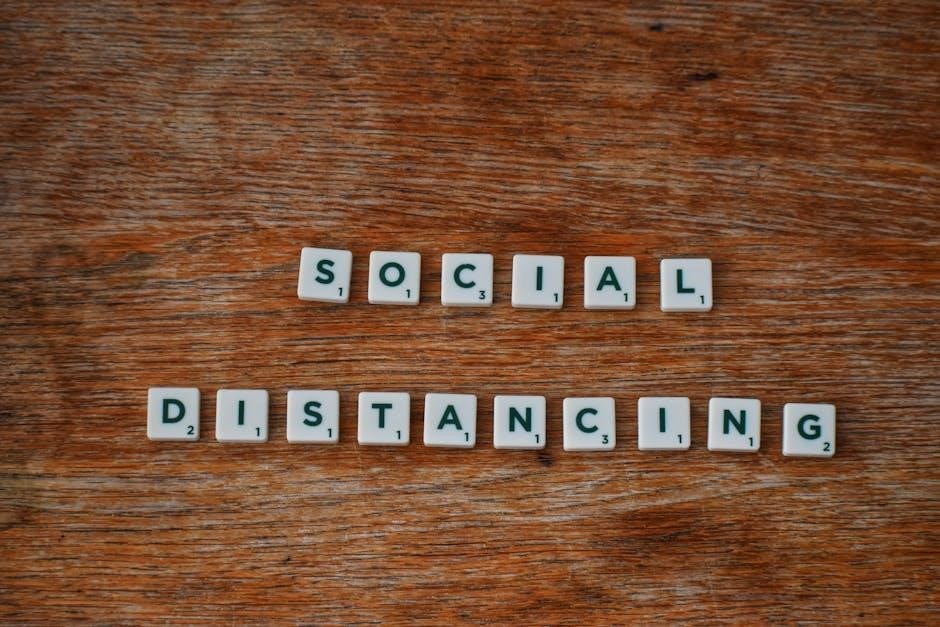Mental Health Games and Activities: A PDF Guide
Explore a comprehensive guide offering mental health games and activities in PDF format․ These resources support well-being and help manage everyday disruptions related to mental health․ Discover fun and interactive ways to approach mental health․
In today’s fast-paced world‚ mental well-being is more critical than ever․ This guide introduces a collection of engaging mental health games and activities available in convenient PDF format․ These resources offer an alternative and approachable way to foster conversations and learning around mental health‚ making them particularly useful for those who might find traditional discussions challenging․ Mental health games and activities can be a powerful tool for promoting self-care‚ building empathy‚ and reducing the stigma associated with mental health issues․ They provide a hands-on‚ interactive approach to learning and practicing coping skills‚ allowing individuals to explore their emotions and develop strategies for managing their mental well-being in a fun and engaging way․ Whether used in schools‚ workplaces‚ or at home‚ these activities can create a safe and supportive environment for individuals to connect with their inner selves and with others․ The PDF format makes these resources easily accessible and shareable‚ ensuring that everyone has the opportunity to benefit from them․ From thought record worksheets and daily mood trackers to games designed to inspire creativity and empathy‚ this guide offers a diverse range of activities to suit different needs and preferences․ By incorporating these games and activities into daily life‚ individuals can take proactive steps towards improving their mental health and overall well-being‚ ultimately leading to a happier‚ healthier‚ and more fulfilling life․ Embrace the power of play and embark on a journey of self-discovery and mental wellness with this comprehensive PDF guide․
Types of Mental Health Games and Activities in PDF Format

The realm of mental health support has expanded to include a variety of engaging games and activities‚ many of which are readily available in the convenient PDF format․ These resources cater to diverse needs and preferences‚ offering tools for self-reflection‚ emotional regulation‚ and social interaction․ Among the most common types are worksheets designed for personal introspection‚ such as thought record worksheets that help individuals identify and challenge negative thought patterns․ Daily mood trackers provide a simple yet effective way to monitor emotional fluctuations‚ enabling users to recognize triggers and patterns over time․ Beyond individual exercises‚ there are also games designed to foster empathy and communication within groups․ These activities often involve role-playing‚ storytelling‚ or collaborative problem-solving‚ encouraging participants to understand and appreciate different perspectives․ Furthermore‚ some PDF resources offer creative outlets like coloring pages‚ journaling prompts‚ and art therapy exercises‚ which can be particularly helpful for individuals who struggle to express their emotions verbally․ The accessibility of these PDF games and activities makes them a valuable resource for individuals‚ therapists‚ educators‚ and community organizations alike․ They can be easily downloaded‚ printed‚ and shared‚ ensuring that support is readily available to those who need it․ Whether it’s a simple worksheet for tracking emotions or a complex game designed to build empathy‚ these PDF resources offer a diverse range of tools for promoting mental well-being and fostering a more supportive and understanding community․ By leveraging the power of play and creativity‚ these activities can help individuals develop coping skills‚ manage stress‚ and build resilience‚ ultimately leading to a happier and healthier life․ The variety ensures something for everyone․
Target Audience for Mental Health Activities

Mental health games and activities‚ particularly those available in PDF format‚ are designed to be inclusive and adaptable‚ catering to a wide range of age groups and demographics․ These resources are not limited to individuals with diagnosed mental health conditions; rather‚ they are valuable tools for anyone seeking to improve their overall well-being and enhance their emotional intelligence․ Children can benefit from simple and engaging activities that help them understand and express their feelings‚ develop coping mechanisms for stress‚ and build positive self-esteem․ Teenagers‚ who often face unique challenges related to identity‚ peer pressure‚ and academic stress‚ can utilize these games and activities to navigate these complexities and develop healthy coping strategies․ Adults‚ too‚ can find these resources beneficial for managing stress‚ improving communication skills‚ and fostering stronger relationships․ The versatility of mental health games and activities extends beyond age groups‚ encompassing individuals from diverse cultural backgrounds‚ socioeconomic statuses‚ and educational levels․ Many PDF resources are designed to be culturally sensitive and adaptable to different contexts‚ ensuring that they are relevant and accessible to a global audience․ Furthermore‚ these activities can be utilized in various settings‚ including schools‚ workplaces‚ community centers‚ and therapeutic environments․ Therapists and counselors can incorporate these games and activities into their sessions to engage clients‚ promote self-reflection‚ and facilitate the development of coping skills․ Educators can use them in the classroom to foster a supportive and inclusive learning environment‚ promote emotional literacy‚ and address issues such as bullying and stress․ Ultimately‚ the target audience for mental health games and activities is anyone who seeks to improve their emotional well-being‚ enhance their relationships‚ and build a more resilient and fulfilling life․
Benefits of Using Games and Activities for Mental Health

The integration of games and activities into mental health practices‚ especially those readily available in PDF format‚ offers a multitude of benefits that extend beyond traditional therapeutic approaches․ These benefits encompass improved emotional regulation‚ enhanced communication skills‚ reduced stigma surrounding mental health‚ and increased engagement in self-care practices․ One of the primary advantages is the ability to make mental health conversations more accessible and less intimidating․ Games and activities provide a safe and playful environment for individuals to explore their emotions‚ thoughts‚ and behaviors without feeling overwhelmed or judged․ This is particularly beneficial for children and adolescents who may struggle to articulate their feelings directly․ Furthermore‚ these resources can foster empathy and understanding among participants․ Many activities involve role-playing‚ perspective-taking‚ and collaborative problem-solving‚ which can help individuals develop a greater appreciation for the experiences of others․ This can lead to improved relationships‚ reduced conflict‚ and a more supportive community; Another significant benefit is the promotion of self-awareness and self-reflection․ Worksheets and activities that encourage individuals to track their moods‚ identify their triggers‚ and challenge negative thought patterns can be instrumental in developing a deeper understanding of themselves․ This self-knowledge is essential for managing stress‚ coping with difficult emotions‚ and making positive changes in their lives․ The readily available PDF format of these resources makes them easily accessible and convenient to use․ Individuals can download and print these materials from the comfort of their own homes‚ eliminating barriers such as cost and transportation․ This accessibility is particularly important for individuals who may not have access to traditional mental health services․ Moreover‚ games and activities can be a fun and engaging way to learn new skills and practice self-care․ Unlike traditional therapy‚ which can sometimes feel like a chore‚ these resources offer a more playful and interactive approach to mental well-being․ This can increase motivation and adherence‚ leading to more positive outcomes․
Examples of Mental Health Games and Activities
Numerous mental health games and activities‚ often available in convenient PDF formats‚ cater to diverse needs and age groups‚ offering engaging ways to promote well-being․ One popular example is the “Thought Record Worksheet‚” designed to help individuals identify and challenge negative thought patterns․ By systematically recording their thoughts‚ feelings‚ and behaviors in specific situations‚ users can gain valuable insights into their cognitive distortions and develop more balanced perspectives․ Another widely used activity is the “Feeling Wheel‚” a visual tool that helps individuals expand their emotional vocabulary and accurately identify their feelings․ This activity is particularly helpful for those who struggle to express their emotions or have difficulty differentiating between various feelings․ The “Daily Mood Tracker” is another valuable resource‚ allowing individuals to monitor their mood fluctuations over time․ By tracking their daily mood‚ energy levels‚ and activities‚ users can identify patterns and triggers that may be affecting their mental well-being․ This information can be used to make informed decisions about self-care and lifestyle adjustments․ “Self-Care Checkup” is another activity that encourages individuals to assess their current self-care practices and identify areas where they can improve․ This activity prompts users to reflect on their physical‚ emotional‚ social‚ and spiritual needs and develop a plan for incorporating more self-care into their daily routine․ Beyond worksheets and trackers‚ interactive games can also be effective tools for promoting mental health․ For example‚ “Fishbowl” is a popular activity that encourages open and honest conversations about mental health․ Participants take turns sitting in the “fishbowl” and answering questions about their experiences‚ while others listen and offer support․ This activity can help reduce stigma and create a sense of community․ Other games‚ such as card games and board games‚ can also be adapted to promote mental health․ For example‚ a card game could be used to spark conversations about emotions‚ while a board game could be used to practice problem-solving skills․ These examples highlight the diverse range of mental health games and activities available‚ offering something for everyone․ The accessibility of these resources in PDF format makes them easy to use and integrate into daily life․

Specific Activities: Thought Record Worksheet and Daily Mood Tracker
Two particularly useful mental health activities often found in PDF guides are the Thought Record Worksheet and the Daily Mood Tracker․ The Thought Record Worksheet is a structured tool designed to help individuals identify‚ evaluate‚ and modify negative or unhelpful thought patterns․ This activity typically involves several steps‚ starting with identifying a specific situation that triggered a negative emotion․ The individual then records their automatic thoughts – the immediate thoughts that came to mind in that situation․ Next‚ they identify the emotions they experienced and rate the intensity of each emotion․ The core of the Thought Record Worksheet lies in evaluating the evidence for and against the automatic thoughts․ This step encourages individuals to examine the rationality of their thoughts and consider alternative perspectives․ By weighing the evidence‚ individuals can identify cognitive distortions‚ such as overgeneralization‚ catastrophizing‚ or black-and-white thinking․ Finally‚ the individual formulates a more balanced and realistic thought to replace the original automatic thought․ This revised thought should be based on the evidence and consider alternative perspectives․ Regularly using the Thought Record Worksheet can help individuals become more aware of their thought patterns‚ challenge negative thinking‚ and develop more adaptive coping mechanisms․ The Daily Mood Tracker‚ on the other hand‚ is a simple yet effective tool for monitoring mood fluctuations over time․ This activity typically involves tracking mood on a daily basis‚ often using a rating scale to indicate the intensity of different emotions‚ such as happiness‚ sadness‚ anxiety‚ or anger․ In addition to tracking mood‚ individuals may also record factors that could be influencing their mood‚ such as sleep quality‚ stress levels‚ social interactions‚ or physical activity․ By tracking these factors alongside their mood‚ individuals can identify potential triggers and patterns that may be affecting their mental well-being․ The Daily Mood Tracker can also be used to monitor the effectiveness of interventions‚ such as therapy or medication․ By tracking mood before and after starting a new treatment‚ individuals can assess whether the intervention is having a positive impact․ Both the Thought Record Worksheet and the Daily Mood Tracker are valuable tools for promoting self-awareness‚ managing emotions‚ and improving overall mental health․ Their accessibility in PDF format makes them readily available for individuals seeking to take proactive steps towards their well-being․
Grounding Techniques and Activities
Grounding techniques are a set of strategies designed to help individuals manage overwhelming emotions‚ anxiety‚ or dissociation by reconnecting them to the present moment․ These techniques are particularly useful when feeling detached from reality‚ experiencing flashbacks‚ or struggling with intense emotional distress․ Grounding activities aim to shift focus away from distressing thoughts and sensations and bring attention back to the immediate environment․ A variety of grounding exercises can be easily accessed in PDF format‚ offering a readily available resource for individuals seeking to improve their emotional regulation skills․ One common type of grounding technique involves engaging the five senses․ This could include focusing on what you can see‚ hear‚ smell‚ taste‚ and touch․ For example‚ the “5-4-3-2-1” technique encourages individuals to identify five things they can see‚ four things they can touch‚ three things they can hear‚ two things they can smell‚ and one thing they can taste․ This exercise helps to anchor individuals in the present by drawing their attention to sensory details․ Another grounding technique involves focusing on physical sensations․ This could include noticing the feeling of your feet on the ground‚ the weight of your body in a chair‚ or the temperature of the air around you․ Simple actions like taking slow‚ deep breaths can also be effective in promoting a sense of calm and stability․ Some grounding activities involve mental exercises‚ such as counting backwards from 100‚ reciting a poem or song‚ or describing a familiar object in detail․ These mental tasks help to redirect attention away from distressing thoughts and engage the mind in a more focused and controlled manner․ Mindfulness exercises‚ such as body scans or mindful breathing‚ can also be used as grounding techniques․ These exercises encourage individuals to pay attention to their present-moment experience without judgment‚ fostering a sense of awareness and acceptance․ The availability of grounding techniques and activities in PDF format makes them easily accessible for individuals to practice independently․ These resources often provide step-by-step instructions‚ visual aids‚ and helpful tips for implementing the techniques effectively․ Regular practice of grounding techniques can help individuals develop greater resilience in the face of stress‚ improve their ability to manage difficult emotions‚ and enhance their overall sense of well-being․
